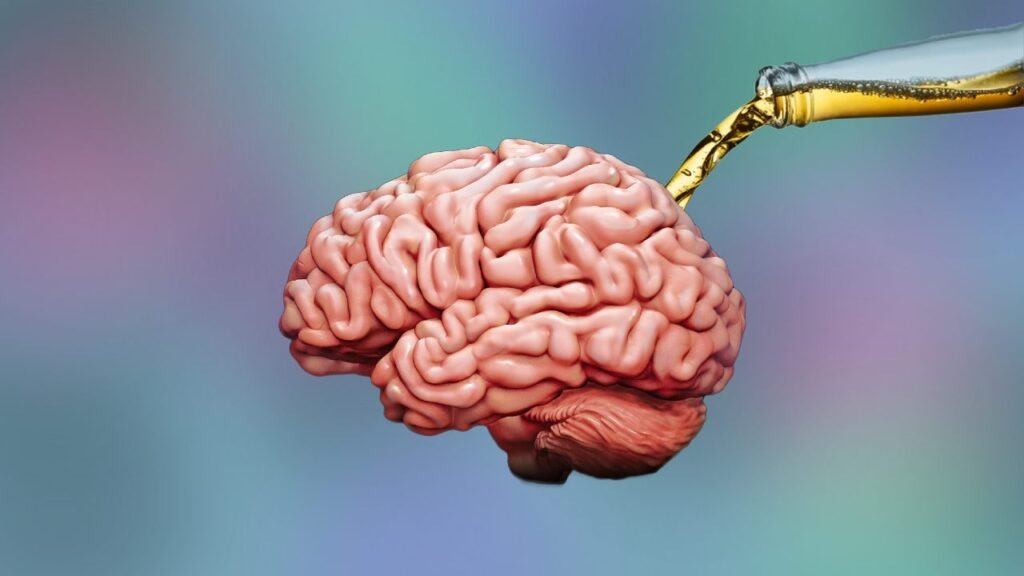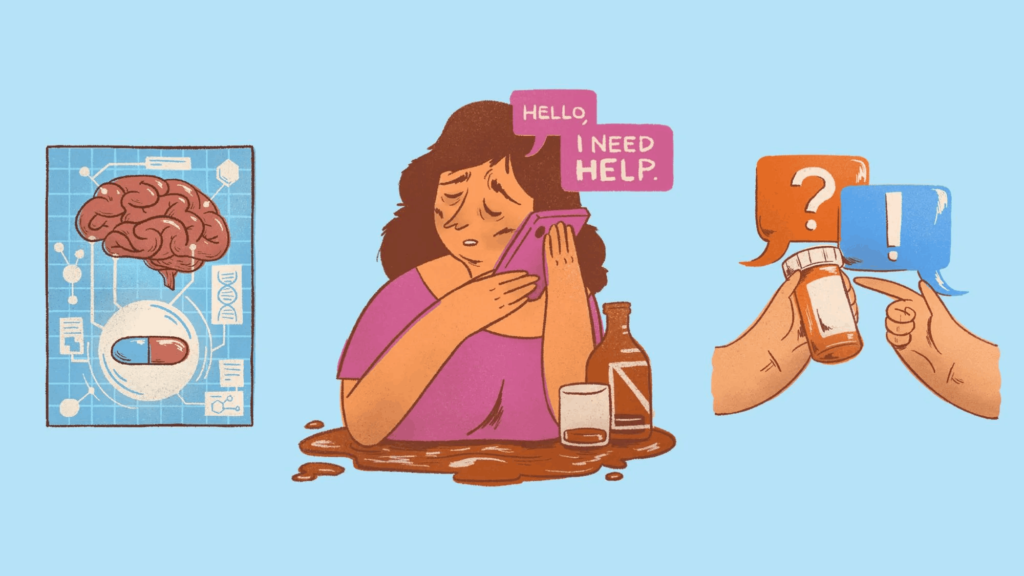ADHD and alcohol share a complex relationship that can significantly impact individuals living with Attention-Deficit/Hyperactivity Disorder. While alcohol is often consumed socially or as a way to unwind, its effects on the brain can be particularly concerning for those with ADHD. Studies have shown that individuals with ADHD may be more prone to using alcohol as a form of self-medication, but this can lead to a range of risks, including exacerbation of symptoms, increased impulsivity, and a higher likelihood of developing dependency. Understanding the connection between ADHD and alcohol is crucial to making informed decisions about consumption and seeking healthier coping mechanisms.
How Does Alcohol Affect the Brain?
Alcohol is a central nervous system depressant that impacts the brain in multiple ways, affecting mood, cognition, and behavior. When consumed, alcohol crosses the blood-brain barrier and alters the balance of neurotransmitters—chemical messengers that regulate brain activity. These changes can have both immediate and long-term effects on brain function, particularly for individuals with ADHD.
In the short term, alcohol increases the activity of gamma-aminobutyric acid (GABA), a neurotransmitter responsible for calming the brain and reducing anxiety. This is why alcohol is often associated with feelings of relaxation or lowered inhibitions. However, it simultaneously decreases the activity of glutamate, a neurotransmitter involved in excitatory functions like focus and memory. These changes can result in poor decision-making, impaired judgment, and slower reaction times.
For individuals with ADHD, the effects of alcohol on the brain are even more pronounced. ADHD is associated with an imbalance in dopamine, a neurotransmitter critical for motivation, reward, and focus. Alcohol temporarily increases dopamine levels, which may explain why some individuals with ADHD turn to alcohol to self-medicate. However, this spike is short-lived and often followed by a significant drop, leading to worsened ADHD symptoms like impulsivity, inattention, and restlessness.
Chronic alcohol consumption can also lead to long-term brain changes, including damage to the prefrontal cortex—the area responsible for executive functions such as planning, decision-making, and impulse control. This damage can be particularly harmful for individuals with ADHD, as the prefrontal cortex is already an area of concern in the disorder.
Understanding the effects of alcohol on the brain highlights the risks for individuals managing both ADHD and alcohol use. Awareness of these impacts is crucial to making healthier lifestyle choices and reducing potential harm.

Read Also : ADHD Limerence: Understanding the Intense Emotional Obsessions in ADHD
The Link Between ADHD and Alcohol
The relationship between ADHD and alcohol is complex, shaped by biological, psychological, and social factors. Research has consistently shown that individuals with ADHD are more likely to engage in risky alcohol consumption behaviors compared to those without the condition. This connection stems from both the neurological underpinnings of ADHD and the coping mechanisms often employed by those living with the disorder.
- Self-Medication and Impulsivity
One of the primary links between ADHD and alcohol is the tendency for individuals with ADHD to use alcohol as a form of self-medication. ADHD is characterized by difficulties in regulating attention, managing impulses, and controlling hyperactivity. These challenges can lead to heightened stress, frustration, and emotional dysregulation. Alcohol, with its sedative effects, may temporarily provide relief by reducing feelings of restlessness or anxiety.
However, this short-term relief often comes at a cost. The impulsivity associated with ADHD can drive individuals to consume excessive amounts of alcohol, increasing their risk of developing dependency or engaging in dangerous behaviors such as drunk driving or unprotected sex.
- ADHD and Alcohol : Neurological Factors
ADHD is linked to an imbalance in dopamine levels in the brain, a neurotransmitter involved in reward, pleasure, and motivation. Alcohol also impacts dopamine by temporarily increasing its levels, creating a sense of euphoria or relaxation. For individuals with ADHD, this dopamine boost may feel particularly rewarding, reinforcing the cycle of alcohol use. Unfortunately, this effect is short-lived, and frequent alcohol consumption can deplete dopamine levels over time, exacerbating ADHD symptoms and creating a reliance on alcohol for perceived relief.
- Co-Occurring Disorders
Another factor in the ADHD-alcohol link is the prevalence of co-occurring mental health disorders. People with ADHD often experience anxiety, depression, or other mood disorders, which can further drive alcohol use as a coping mechanism. These overlapping conditions create a cycle of dependence that is challenging to break without targeted interventions.
- Social and Environmental Influences
Social and environmental factors also play a significant role in the connection between ADHD and alcohol. Peer pressure, a desire to fit in, or the need to escape from academic, professional, or personal challenges often push individuals toward alcohol use. ADHD-related impulsivity may make it harder for individuals to resist these external pressures.
- ADHD and Alcohol : Breaking the Cycle
Understanding the link between ADHD and alcohol is the first step toward addressing it. With proper education, treatment, and support, individuals with ADHD can adopt healthier coping strategies and reduce their reliance on alcohol. Cognitive-behavioral therapy, medication, and lifestyle changes can help manage ADHD symptoms effectively, reducing the appeal of alcohol as a temporary solution.
This complex relationship underscores the importance of raising awareness about the risks and providing resources for those affected. Recognizing and addressing the link between ADHD and alcohol can empower individuals to make informed choices and seek support when needed.
Why People with ADHD May Turn to Alcohol
The connection between ADHD and alcohol is influenced by several factors. Here are the main reasons individuals with ADHD may turn to alcohol:
- Self-Medication for ADHD Symptoms:
- Alcohol provides temporary relief from inattention, hyperactivity, and restlessness.
- Its sedative effects help reduce anxiety, but over time, alcohol worsens ADHD symptoms by disrupting sleep and depleting dopamine levels.
- Emotional Dysregulation:
- People with ADHD often struggle to manage stress, frustration, or rejection.
- Alcohol temporarily numbs emotional pain but can lead to increased sadness or irritability after the effects wear off.
- Impulsivity and Risk-Taking Behaviors:
- Impulsivity makes it harder to resist the temptation to drink.
- This can lead to binge drinking or unsafe behaviors, further increasing the risks of alcohol use.
- Social Pressures and Environmental Triggers:
- Peer pressure or the desire to fit in can push individuals with ADHD toward alcohol.
- Impulsive tendencies make them more susceptible to external influences, leading to heavier drinking.
- Perceived Temporary Benefits:
- Alcohol temporarily boosts dopamine, which is often imbalanced in people with ADHD, creating a short-lived sense of reward or calm.
- Lack of Healthy Coping Mechanisms:
- Without proper tools to manage ADHD symptoms, individuals may turn to alcohol as an accessible but harmful coping strategy.
By recognizing these factors, individuals with ADHD can seek healthier ways to manage their symptoms and emotional challenges without relying on alcohol.
Read Also : ADHD and Relationships: Understanding the Challenges and Building Stronger Bonds
The Risks of Alcohol Consumption for Individuals with ADHD
The combination of ADHD and alcohol poses unique risks that can impact physical health, mental well-being, and daily functioning. While alcohol may provide temporary relief from ADHD symptoms, its effects are largely harmful in both the short and long term. Below are the key risks associated with alcohol consumption for individuals with ADHD:
- Exacerbation of ADHD Symptoms:
- Alcohol disrupts brain function and depletes neurotransmitters like dopamine, which are already imbalanced in individuals with ADHD.
- This can worsen inattention, impulsivity, and hyperactivity.
- Impaired Judgment and Risky Behavior:
- The impulsivity associated with ADHD is heightened under the influence of alcohol.
- This can lead to poor decision-making, such as engaging in unsafe activities, binge drinking, or reckless driving.
- Increased Risk of Dependency:
- Individuals with ADHD are more prone to developing alcohol dependence as a form of self-medication.
- The temporary relief provided by alcohol can create a cycle of habitual use, leading to addiction.
- Negative Interaction with ADHD Medications:
- Alcohol can interfere with the effectiveness of ADHD medications, particularly stimulants like Adderall or Ritalin.
- Combining the two can cause side effects such as increased heart rate, anxiety, or even dangerous cardiovascular issues.
- ADHD and alcohol : Cognitive Decline:
- Chronic alcohol use can damage areas of the brain responsible for executive functions, such as planning, memory, and decision-making.
- This can further impair the ability of individuals with ADHD to manage their daily lives.
- Emotional Dysregulation:
- Alcohol is a depressant that can worsen emotional instability, a common challenge for individuals with ADHD.
- It may lead to heightened feelings of sadness, frustration, or irritability over time.
- ADHD and alcohol : Sleep Disruptions:
- Alcohol consumption interferes with sleep quality and patterns, which are already often problematic for people with ADHD.
- Poor sleep can exacerbate ADHD symptoms and reduce overall functioning.
- Long-Term Health Consequences:
- Regular alcohol use increases the risk of liver damage, cardiovascular issues, and mental health disorders.
- These health problems can be particularly detrimental for individuals already managing ADHD.
Understanding these risks highlights the importance of seeking healthier coping mechanisms and strategies to manage ADHD symptoms without relying on alcohol.
The Impact of Alcohol on ADHD Medications
The interaction between ADHD and alcohol is particularly concerning when it comes to the use of ADHD medications. Combining alcohol with these medications can lead to a range of adverse effects, including reduced efficacy, heightened side effects, and serious health risks. Below are the key ways alcohol impacts ADHD medications:
1. Reduced Effectiveness of ADHD Medications
- Alcohol interferes with how ADHD medications, particularly stimulants like Adderall, Ritalin, or Vyvanse, are metabolized in the body.
- This can reduce the drugs’ ability to improve focus, attention, and impulse control.
- As a result, ADHD symptoms may remain unmanaged, leading to frustration and poor performance in daily tasks.
2. Increased Side Effects
- Alcohol can amplify the side effects of ADHD medications, including nausea, dizziness, and an elevated heart rate.
- For non-stimulant ADHD medications like Strattera, alcohol may increase sedation, making individuals feel excessively tired or lethargic.
3. Risk of Cardiovascular Issues
- Stimulant medications for ADHD increase heart rate and blood pressure.
- Alcohol can further elevate these effects, potentially leading to dangerous cardiovascular problems such as irregular heartbeat or hypertension.
4. Heightened Risk of Overdose
- Alcohol can mask the sedative effects of certain ADHD medications, leading individuals to consume higher doses than intended.
- This increases the risk of overdose or severe toxicity, particularly in cases where stimulants and alcohol are used together.
5. Impact on Mental Health
- Combining alcohol with ADHD medications can worsen mental health issues, such as anxiety, depression, or emotional instability.
- Alcohol is a depressant, which may counteract the mood-regulating benefits of ADHD medications and exacerbate emotional dysregulation.
6. ADHD and alcohol : Disrupted Sleep Patterns
- Many ADHD medications can already affect sleep, particularly if taken later in the day.
- Alcohol further disrupts sleep cycles, leading to poorer sleep quality and exacerbating ADHD symptoms such as fatigue, irritability, and difficulty concentrating.
7. Potential for Dependency
- The dopamine-boosting effects of both alcohol and ADHD stimulants may create a reinforcing cycle of use.
- Individuals may rely on the combination to feel “normal,” increasing the risk of addiction to either substance.
8. Dangerous Behavioral Impacts
- Alcohol impairs judgment and impulse control, and when combined with ADHD medications, this effect can be magnified.
- This may lead to dangerous behaviors, such as reckless driving or risky social interactions.
Conclusion:
The combination of ADHD and alcohol, particularly when medications are involved, poses significant risks to physical and mental health. To avoid these complications, individuals should consult their healthcare providers about the effects of alcohol and explore safer strategies to manage ADHD symptoms.
Seeking Help: Support for ADHD and Alcohol-Related Issues
Managing ADHD and alcohol-related issues can be challenging, but seeking the right support is a crucial step toward recovery and better health. Understanding the available resources and strategies can help individuals address the underlying challenges of ADHD while reducing or eliminating harmful alcohol use. Here are some steps to consider:

1. Recognizing the Problem
- Acknowledge how alcohol consumption affects ADHD symptoms and overall well-being.
- Reflect on whether alcohol is being used to self-medicate or cope with stress, impulsivity, or emotional dysregulation.
2. Seeking Professional Help
- Medical Consultation: Talk to a healthcare provider or psychiatrist who specializes in ADHD and substance use. They can assess the situation and recommend treatment options.
- Therapists and Counselors: Working with a therapist trained in dual diagnosis can address both ADHD symptoms and alcohol dependency.
3. Exploring Behavioral Therapies
- Cognitive Behavioral Therapy (CBT): CBT is an effective approach for managing ADHD and breaking unhealthy habits, including alcohol use. It helps individuals identify triggers and develop healthier coping mechanisms.
- Motivational Interviewing (MI): This technique helps individuals explore and resolve ambivalence about reducing or quitting alcohol consumption.
4. Joining Support Groups
- Alcoholics Anonymous (AA): AA provides a supportive community and resources for individuals struggling with alcohol dependency.
- ADHD-Specific Groups: Online or local ADHD support groups can offer insights and encouragement from others facing similar challenges.
5. Adopting Healthier Coping Strategies
- Replace alcohol with activities that promote relaxation or provide a dopamine boost, such as exercise, mindfulness practices, or hobbies.
- Develop structured routines to minimize impulsivity and create a sense of stability.
6. Medication Management
- Discuss medication options with a doctor to manage ADHD symptoms effectively without turning to alcohol for relief.
- Avoid mixing alcohol with ADHD medications, as it can worsen side effects and reduce efficacy.
7. Building a Strong Support Network
- Share your challenges with trusted friends or family members who can provide encouragement and accountability.
- Consider involving loved ones in therapy sessions to strengthen understanding and support.
8. Using Educational Resources
- Learn about the effects of ADHD and alcohol on the brain and body.
- Access books, podcasts, or online courses that provide strategies for managing ADHD without relying on alcohol.
Conclusion: ADHD and alcohol
Seeking help for ADHD and alcohol-related issues requires courage and a commitment to change. With the right support systems in place, individuals can break the cycle of dependency, manage ADHD symptoms effectively, and lead a healthier, more fulfilling life. The journey may be challenging, but recovery is always within reach with the proper resources and guidance.


